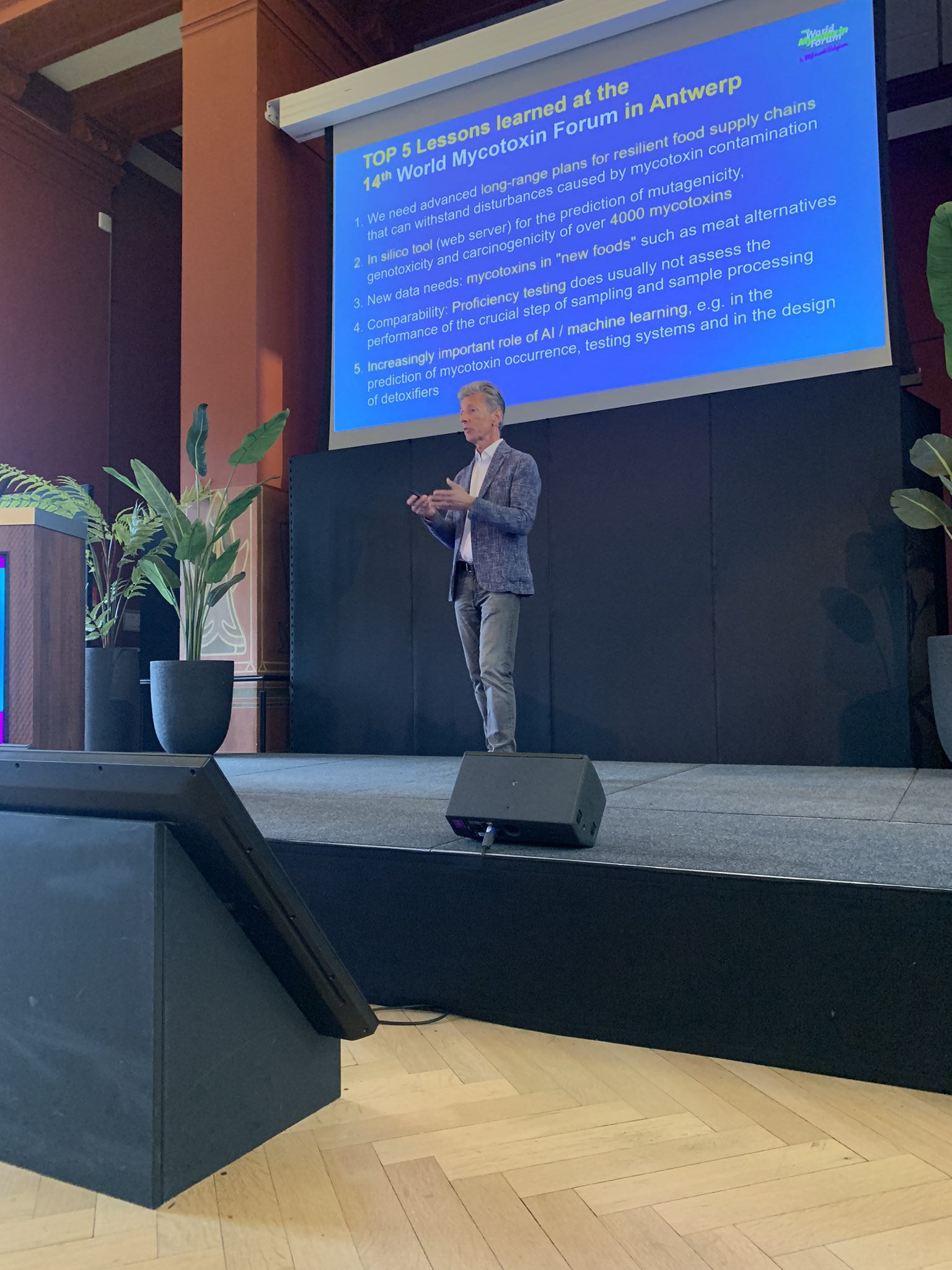9 - 11 October 2023. 14th conference of The World Mycotoxin Forum
The 14th edition of the World Mycotoxin Forum brought together over 450 mycotoxin specialists and scientists to explore the latest trends, breakthroughs, and transformative discoveries in mycotoxin research.
TOP 5 Lessons learned at the 14th World Mycotoxin Forum in Antwerp
- We need advanced long-range plans for resilient food supply chains that can withstand disturbances caused by mycotoxin contamination.
- In silico tool (web server) for the prediction of mutagenicity, genotoxicity and carcinogenicity of over 4000 mycotoxins.
- New data needs: mycotoxins in "new foods", such as meat alternatives.
- Comparability: Proficiency testing does usually not assess the performance of the crucial step of sampling and sample processing.
- Increasingly important role of AI / machine learning, e.g., in the prediction of mycotoxin occurrence, testing systems, and in the design of detoxifiers.
Interactive debate – A WORLD TOUR ON CLIMATE CHANGE AND THE BATTLE AGAINST MYCOTOXINS
This initiative was organised by the International Society for Mycotoxicology (ISM). The debate was a world tour on climate change and the battle against mycotoxins. The panel consisted of the presidents of different mycotoxicology societies from all over the world. As well as ISM, the Latin America and the African Society of Mycotoxicology presented together with the Society for Mycotoxin Research. Per country there is a Thai, Japanese and Nigerian Society of Mycotoxicology.The panel consisted of Prof. Amnart Poapolathep (Thai Society of Mycotoxicology),
Prof. Kiminori Shimizu (Japanese Society for Mycotoxicolog), Prof. Yemisi Jeff-Agboola
(Mycotoxicology Society of Nigeria), Prof. Hans-Ulrich Humpf (Society for Mycotoxin
Research), Dr. Lindy Rose (African Society of Mycotoxicology), and Dr. Juan Manuel Palazzini
(Latin American Society of Mycotoxicology).
The presidents of the societies are not be experts on climate change, but they know about the current situation in their continent or country. A number of companies gave their views on mycotoxins and climate change. This was a great example of continuous interaction between scientists and industry.
African contributions (extract of the program + abstracts)
- 10/10 Untangling the complex web of aflatoxins and fumonisins using bentonite and fumonisin esterase as sustainable solutions for safer poultry production in Kenya Dr Phillis Ochieng, Nairobi University, Kenya and International Livestock Research Institute (ILRI), Kenya
- 10/10 Exposomics study for investigating mycotoxins exposure and the association with biomolecular markers of aging and birth outcomes in rural Burkina Faso Yuri Bastos Moreira, Centre of Excellence in Mycotoxicology and Public Health, Ghent University, Belgium
- 11/10 NutriNuts: Success story of industrial partnership toward sustainable mitigation of aflatoxin in Africa Dr Carol Verheecke-Vaessen, Applied Mycology Group, Cranfield University, UK
- 11/10 Multi-actor collaboration: Everyone at the table for improved mycotoxin risk analysis – A perspective for the European and the African Union Dr Celine Meerpoel, Centre of Excellence in Mycotoxicology and Public Health, Ghent University, Belgium
- 11/10 Shaping the future of mycotoxin management in Sub-Saharan Africa with pragmatism Prof. Limbikani Matumba, Faculty of Life Sciences and Natural Resources, Lilongwe University of Agriculture & Natural Resources, Malawi
Related:
2 - 3 October 2023. Lusaka, Zambia. FARA participated in a capacity-building workshop on domesticating the African Union (AU) strategic framework for holistic aflatoxin control.Convened by the African Union Commission (AUC), the meeting was part of the activities of the Partnership for Aflatoxin Control in Africa (PACA), a program of the AUC, which was launched in October 2012 as endorsed by the African Union Executive Council through Decision No. EX.CL/768 (XXII), to coordinate and support aflatoxin mitigation and management across Africa’s health, agriculture, and trade sectors.
The objective of the meeting was to raise awareness of the PACA aflatoxin country-led model and the tools within the Strategic framework for implementation at the regional and country levels. It also served as a platform for taking stock of successes and challenges in implementing the country-led model.
Related:
19 September 2023. Addressing the global challenge of mycotoxins.This was the focus of Professor Patrick Njobeh, Professor in Biotechnology and Food Technology at the University of Johannesburg (UJ) who delivered a compelling inaugural address at Ubuntu Chambers, Madibeng Building, Auckland Park Kingsway Campus on September 18, 2023.
“There is substantial evidence indicating that mycotoxins are a global problem causing devastating effects on human and animal health, food nutrition and security and the economy, particularly throughout sub-Saharan Africa.” Prof. Patrick Njobeh’s inaugural lectureThe lecture highlighted the prevalence of toxic food and feed contaminants in sub-Saharan Africa, attributing this to various factors, including ecological conditions conducive to fungal and mycotoxin contamination, inadequate food quality control, subpar storage conditions, food scarcity, and limited awareness. Socio-political factors were also identified as significant contributors.






No comments:
Post a Comment